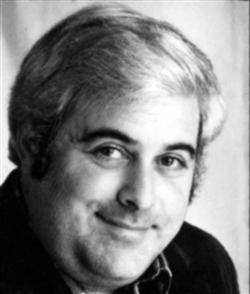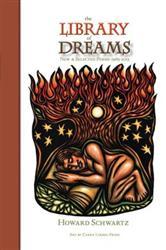Join a community of readers who are committed to Jewish stories
Sign up for JBC’s Nu Reads, a curated selection of Jewish books delivered straight to your door!
Howard Schwartz, three time winner of a National Jewish Book Award, has recently published his fifth volume of poetry, The Library of Dreams.
“There is so much good work here. Howard Schwartz has done the work, and his poems rise out of Jewish learning and of course from his heart, a heart schooled and matured in all that amazing lore.” –Philip Levine
 Grace Stansbery: Throughout the book, you develop relationships with long dead authors, specifically Jorge Luis Borges and Franz Kafka. Ignoring the obvious ice-breaker question, “If you could have dinner with anyone from history…” I wonder which two authors you would set up to observe having dinner together.
Grace Stansbery: Throughout the book, you develop relationships with long dead authors, specifically Jorge Luis Borges and Franz Kafka. Ignoring the obvious ice-breaker question, “If you could have dinner with anyone from history…” I wonder which two authors you would set up to observe having dinner together.
Howard Schwartz: I’ve come to realize that I’m one of those people who has heroes. When I was a child, it was Alexander the Great. As an adolescent, I was obsessed with J. D. Salinger. Since my twenties, I’ve focused on Kafka and Borges. As I mention in the notes to The Library of Dreams, “Borges has become, like Franz Kafka, a mythic figure in our time, and a presence in my dreams.” Borges has acknowledged his immense debt to Kafka, saying that if not for Kafka he couldn’t have written anything. One of the thrills of my life was spending time with Borges when he came through St. Louis, Missouri in 1967. I also have poet heroes, of course, especially Theodore Roethke and James Wright. When I was in New York in the late 70s I called up James Wright and he invited me to visit him. That was truly a wonderful, memorable visit.
GS: The poems in The Library of Dreams seem to be derived from very different places thematically and stylistically; For example, “Before You Were Born” comes from one of your children’s books. Do you find that your poetry lends itself better to one audience over another? Have you encountered unexpected success writing for certain groups or in certain genres?
HS: Keep in mind that The Library of Dreams covers 48 years — I changed, of course, and so did my style. My friend Michael Castro teased me by saying, “It took you forty years to figure out how to write a poem, but you finally did!” I started out convinced that images are the building blocks of poems. I still believe that, but now my language is closer to my voice and my poems don’t consist entirely of images, as they did in my first book, Vessels. Consider this poem, “Reckoning”:
For every dark cloud, a red warning.
For every blade brighter than the sun,
an animal clawing
the darkness.
For every wounded tree,
a dark sun dropping out of the sky.
I wanted to write poems that appealed directly to the emotions, gut to gut. Later I came to appreciate retaining the human context out of which they emerged. Take, for example, “Weighing Gold”:
Knowing my father
wouldn’t live long enough
to see my first book,
I showed him a book
of the same size,
and he closed his eyes,
weighing it in his hand,
the way he weighed gold.
I never felt closer to him.
You asked about audiences. In 1983 I published Elijah’s Violin & Other Jewish Fairy Tales. I had always loved fairy tales, and I felt strongly about my Jewish tradition. I loved working on that book. The response to it and I decided to write stories intended for children. I’ve now published a dozen children’s books, and many readers aren’t aware that I also write for adults! But the truth is that I didn’t have to make a lot of changes in my approach to write for children. I just tried to tell the stories as clearly and simply as I could, and that worked.
GS: I have always believed in the nobility of literary dedications, of which you have many. Can you talk a little bit about the decisions you make when dedicating a work of art to another person? Do you write with the individual in mind or dedicate once the poem is finished? How have the people in your life reacted to such dedications?
HS: Well, sometimes the poems started out to be elegies for close friends, such as Don Finkel, my teacher, (“The Last Reading”) or Yehuda Amichai, a friend for 25 years (“Yehudah Amichai in the Heavenly Jerusalem”). In other cases, the poem came first, and then I realized that it was really intended for one of my friends, such as “A Palace of Bird Beaks.” That’s dedicated to my good friend and fellow poet Dan Jaffe, who was one of the first to support my poetry. He was thrilled with the poem, and understood completely that it was not only an Ars Poetica, but also my gift of thanks to him.
GS: Your poem “People of the Stories” emphasizes the tradition of storytelling within the Jewish religion and culture — what is more is that many of the poems in The Library of Dreams depict stories from the Bible and the Talmud. What is the importance of storytelling in spiritual cultures? Does the same storytelling continue to fill a unique void in global culture today?
HS: It seems indisputable that the most memorable portions of the Bible are the stories — of the creation, the Garden of Eden, Cain and Able, Noah and the ark, Abraham and the binding of Isaac, Jacob’s dream, Joseph’s rise to power in Egypt, the whole incredible Exodus narrative, etc. Because it was believed that there were two Torahs, a written one God dictated to Moses during the day, and an oral one God gave him at night, explaining the written one, the floodgates of Jewish stories were opened. Thousands of stories emerged, claiming to be part of that oral tradition. I spent a year in Israel in 1977- 1978 studying these post-biblical texts — the Talmud, the midrashic collections, the kabbalistic and Hasidic texts, and I’ve been drawing on those wonderful resources ever since. They’re part of me. Later I came to focus on Jewish folklore, inspired by Professor Dov Noy of Hebrew university, the world’s foremost Jewish folklorist, and that turned out to be my destiny. I followed Elijah’s Violin with three other large collections of Jewish folktales, each focused on a separate genre — fairy tales, folktales, supernatural tales and mystical tales. Finally I felt I knew enough to take on my biggest challenge, proving that there is a Jewish mythology. Twelve years later I finished Tree of Souls: The Mythology of Judaism, almost certainly my most important book. It was after I finished this book that I turned back to writing poetry full time, and the past few years have been the most productive of my life.
GS: I have heard that the more often a person focuses on his or her dreams, the more vivid they become. How has your dream journal changed over time? Was it interrupted or strengthened by this particular book of poetry?
HS: I’ve kept a dream journal since 1967. New Letters published a chunk of it a few years back. Now it’s a file on my computer 200 pages long. I guess I’m fortunate that my muse likes to express herself in my dreams. It fits my view that we must be in touch with our unconscious, which is a source of great inspiration. I found confirmation of this view years ago, when I studied Jung, and I still consider myself a Jungian. The images and narratives I drew from my dreams resonated with me, even if I didn’t fully understand them. So it’s true that many of the poems in The Library of Dreams started out as dreams, or I drew on dream images in writing them. Take, for example, “Listening”:
In the dream
I watched her
as she listened to Coltrane—
eyes closed,
lips parted, descending
into the music
and further,
into the one creating it.
There was a moment
when they took a breath
together,
even though he was no longer
breathing.
GS: One motif in particular caught my attention. Lilith floats in and out of your poetry in Library of Dreams—I find, though, that you don’t write about a Queen of Demons, rather something much less evil. Do you care to explain this decision?
 HS: I sometimes think I owe my career to Lilith. Jewish feminists sought to make her a role model in the ’60s, because of her independence and especially her sexual independence. But I knew from my studies that in Jewish folklore she was a dangerous demoness, the incarnation of lust and a child-strangling witch. I had several enjoyable debates with Jewish feminists about Lilith, and I’ve recounted her story about how she was Adam’s first wife, fought with him and escaped from the Garden of Eden and became the Queen of Demons dozens of times. I was astonished at what a powerful impact her story made, especially on women. When I was a student in the 60’s I met three young women who believed, for a few months, that they were Lilith. I saw how powerful a mythic figure could be, and later this convinced me that there was, indeed, a Jewish mythology. So I’m grateful to Lilith and it’s no surprise that she turns up in my poetry. She has been a vivid figure in my life.
HS: I sometimes think I owe my career to Lilith. Jewish feminists sought to make her a role model in the ’60s, because of her independence and especially her sexual independence. But I knew from my studies that in Jewish folklore she was a dangerous demoness, the incarnation of lust and a child-strangling witch. I had several enjoyable debates with Jewish feminists about Lilith, and I’ve recounted her story about how she was Adam’s first wife, fought with him and escaped from the Garden of Eden and became the Queen of Demons dozens of times. I was astonished at what a powerful impact her story made, especially on women. When I was a student in the 60’s I met three young women who believed, for a few months, that they were Lilith. I saw how powerful a mythic figure could be, and later this convinced me that there was, indeed, a Jewish mythology. So I’m grateful to Lilith and it’s no surprise that she turns up in my poetry. She has been a vivid figure in my life.
GS: How often does your writing process rely on your responses to other types of art (whether it is a quote from a religious text or a solo violin sonata)? Does your writing attempt to capture the themes of these works or react to them?
HS: Well, I think that most everything I write is a response to something — a person, a tree, a dream, a book, a piece of music. Isn’t responding to the world what poets do?
Grace Stansbery is an English graduate from Truman State University and lives in St. Louis, MO.